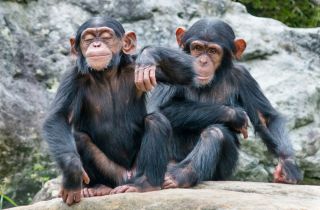Family Dynamics
How Much Does Birth Order Say About Who You Are?
Is the "first-born effect" still meaningful? What about in chimps?
Posted January 14, 2024 Reviewed by Tyler Woods
Key points
- A key feature of human (and chimp) development is individual difference.
- Both chimps and humans grow up in close families with siblings.
- The order of sibling birth may affect differences in individual personalities.

Both humans and chimps grow up with siblings who differ a lot from each other.
Chimpanzees are notoriously unhelpful—that is, there is very little evidence that they go out of their way to invest time or energy in someone else’s plight (unless a solution is also in their own self-interest). Chimps do differ from each other, though, in the way they react to the world—differences that human researchers, studying humans, might call personality: the stable constellation of traits across time and situation that makes each of us unique.
Most of us would agree that some of this (being an extrovert, for example, or being a worrier) is inborn, and some is about life experience. One such life experience is our family, the people we were raised with. Chimps, too, have very close, lifelong family relationships. Might early differences in these affect the way an individual chimp characteristically approaches the world—being more or less helpful, say?
In the conclusion of their paper on the rare and surprising, caretaker-like reactions of several chimpanzees to the injuries of a young peer, Clark and colleagues raise an interesting question. Might these unusually gentle and solicitous behaviors be because the chimps who did them happened to be orphans? That is, might the loss of a family structure (mother, younger siblings) have instilled in them special empathy that they then applied to the world?
Does where you are in the order of siblings matter?
The theory that our siblings, and specifically where we are in the order of siblings in our family, has an effect on our personality has a very long history. The psychoanalyst Alfred Adler wrote a good deal about it, and empirical research thereafter seemed to support his ideas: first-borns are more responsible, higher achieving, and rule-following. Younger siblings are less those things, and rated as more likeable by their peers. Startlingly, differences also showed up on intelligence tests.
In response to the well-replicated finding that later-born siblings score slightly lower on IQ tests than first-born siblings, researchers in the 1970’s proposed a family-based social mechanism, interestingly articulated in a kind of pseudo-mathematic equation. One could, they said, estimate the intellectual climate in a household by adding together the contributions of each member and dividing by the total number of members to get an average. “Contributions” are what each member brings to the table, so to speak, in terms of interesting experiences and teachable content.
When a first child is born, they contribute nothing, but their parents are interesting and involved people in the world, so maybe each parent contributes 100 and the newborn brings 0: the climate in the household is (100+100+0)/3, which is 67. If the next infant is born in three years, this infant will also contribute nothing at first (0). The older child is 3, so maybe contributes a little independent material, but really not much (let’s say 15). Meanwhile, the parents themselves are slightly less interesting than they used to be. They’re reading and discussing ideas less and spending more time pouring juice and watching Teletubbies. So now they’re each at 90. That means the household score is (90+90+15+0)/4, which equals 49.
So that second baby spends their first three years in a different household than the first had for their first three, one with a lower score. And so on. Remember that this theory was specifically about the IQ finding. Of course, the family environment for later-born kids is different in lots of ways, and many of those are great for skill-building. Hence the finding that later-borns are rated more likable and easy-going.
Social mechanism or biological?
The idea that there may be some biological basis to sibling-order differences is not outrageous—after all, the hormonal environment in one person’s uterus might reasonably change with use over time, and this could reasonably affect a developing fetus within. We know that the more older brothers a boy has, the more likely he is to be gay (i.e., subsequent males carried in the same uterus have a heightened likelihood of homosexuality), and there are clear, proposed mechanisms for this (e.g., maternal immune response). Clearly that is not “personality”, but it is about mechanisms that drive behavior in the world.
Might there be some kind of biological mechanism for the IQ effect? Norwegian researchers explored this idea by testing children whose older sibling had died young, meaning that second child was biologically second but functionally the eldest in terms of their role. Those second siblings performed like firstborns, so not biological after all. It’s one example of the general stability of this IQ effect across studies (though note that scoring higher on a test is not necessarily the same as being smarter), but the personality findings have begun to unravel.
A study including hundreds of thousands of American high school students found very little evidence of sibling-based personality differences (but did replicate the IQ finding). These same researchers went on to summarize key methodological problems that plagued previous literature; they ultimately concluded that there are no systematic personality ones. Another recent study, using data from all over the world, found no evidence at all of systematic personality differences related to sibling order.
Does weaning when a sibling arrives build character?
Still, the idea compels. What exactly happens between siblings and their shared parents that makes the idea intuitively seductive? To circle back, might we see some of those same mechanisms in our closest living relative, the chimpanzee? Consider one major challenge a firstborn faces: weaning. Someone new and tiny usurping ownership of your mother, someone you now must share things with for the rest of your life.
Like in humans, chimp weaning can sometimes be big drama. I watched one young chimp with amusement for weeks, who head-butted and tantrumed, flailed and bit, when her little brother arrived. She would lay limply on the path with her eyes closed and refuse to walk, she would elbow the baby when her mom’s head was turned, she would hang over her mom’s shoulder from behind and grab her breast. If that new baby turns out to be his mother’s last, he will never have to deal with that struggle. He’ll stop breastfeeding in his own time, confident in his mother’s availability. Will he be kinder for it? Less kind? More ambitious, or less? If the parallel holds, he’ll test slightly lower on IQ but have more friends, which seems a pretty good trade-off to me.
Facebook image:
References
Clark, I., Sandel, A., Reddy, R. & Langergraber, K. (2021). A preliminary analysis of wound care and other-regarding behavior in wild chimpanzees at Ngogo, Kibale National Park, Uganda. Primates, 62(5), 697-702.
Paulhus, D. L., Trapnell, P. D., & Chen, D. (1999). Birth order effects on personality and achievement within families. Psychological Science, 10(6), 482–488.
Zajonc, R. B., & Markus, G. B. (1975). Birth order and intellectual development. Psychological Review, 82(1), 74–88.
Bogaert, A., Skorska, M., Wang, C., Gabrie, J., MacNeil, A., Hoffarth, M., VanderLaan, D., Zucker, K., & Blanchard, R. (2018). Male homosexuality and maternal immune responsivity to the Y-linked protein NLGN4Y. Proc Natl Acad Sci, 115(2), 302-306.
Kristensen, P. & Bjerkedal, T. (2007). Explaining the relation between birth order and intelligence. Science, 316(5832), 1717.
Damian, R. & Roberts, B. (2015). Settling the debate on birth order and personality. Proc Natl Acad Sci, 112(46),14119-20.
Dudek, T., Brenøe, A., Feld, J., & Rohrer, J. (2022). No evidence that siblings' gender affects personality across nine countries. Psychological Science, 33(9),1574-1587.




